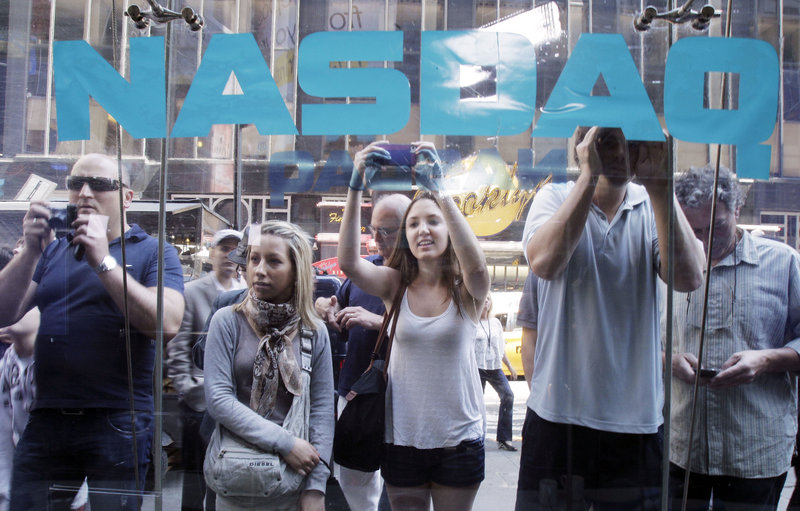SAN JOSE, Calif. – After Facebook stock narrowly stayed above the initial public-offering price during its first day of trading, the price fell hard and fast Monday, knocking more than 10 percent off the company’s record-breaking initial valuation.
Facebook executed its highly anticipated IPO Thursday evening, pricing shares at $38 for total proceeds of $16 billion at a record valuation of $104 billion. Predictions of a first-day jump in the stock price were rampant but fizzled Friday, as shares opened at $42 and almost immediately fell, staying below that mark for the rest of the session.
Shares finished Friday at $38.23, 0.6 percent higher than the price investors paid for IPO stock. Friday reports said the banks that underwrote Facebook’s IPO stepped in to buy stock when shares dipped near $38 on the first day of trading in order to ensure the stock closed above that level.
Without the help of the IPO underwriters, Facebook shares opened Monday at $36.53, but that price immediately dropped to below $36. In the first 30 minutes of trading, shares sold for as low as $33, a decrease of 13.7 percent from Friday’s closing price.
Facebook stock closed at $34.03, 11 percent off Friday’s closing price and more than 10 percent lower than the price investors paid for IPO shares.
Confounding those bullish on Facebook even more was Wall Street’s overall strength Monday: All three major U.S. stock indexes rose at least 1.1 percent.
Facebook CEO and co-founder Mark Zuckerberg saw the value of the 503.6 million Facebook shares he holds slide from $19.25 billion at the end of the day Friday to $18 billion at the start of regular trading Monday and then all the way down to about $16.62 billion.
Founded in a Harvard dorm room in 2004, Facebook now has 900 million users.
But analysts and investors fear that its popularity may not lead to strong revenue, as the company had only $3.7 billion in sales last year and has struggled to determine how to monetize its popularity on mobile devices.
“Investors are increasingly aware of the risk embedded in the stock price. There are real concerns about growth and advertisers’ frequent lack of certainty how best to use Facebook, along with rising costs and ongoing acquisition risk,” Pivotal Research Group analyst Brian Wieser told Reuters.
Mark Siegel, an investor with Menlo Ventures, said that Facebook’s failure to obtain a big initial pop in the stock price was a good thing for the company’s long-term goals, however.
“I’m kind of glad there wasn’t a big pop. Had this thing traded up 50 percent, it would just make the bar that much higher in terms of what the company has to deliver in revenues to avoid disappointing investors,” he said.
Copy the Story Link
Send questions/comments to the editors.



Success. Please wait for the page to reload. If the page does not reload within 5 seconds, please refresh the page.
Enter your email and password to access comments.
Hi, to comment on stories you must . This profile is in addition to your subscription and website login.
Already have a commenting profile? .
Invalid username/password.
Please check your email to confirm and complete your registration.
Only subscribers are eligible to post comments. Please subscribe or login first for digital access. Here’s why.
Use the form below to reset your password. When you've submitted your account email, we will send an email with a reset code.